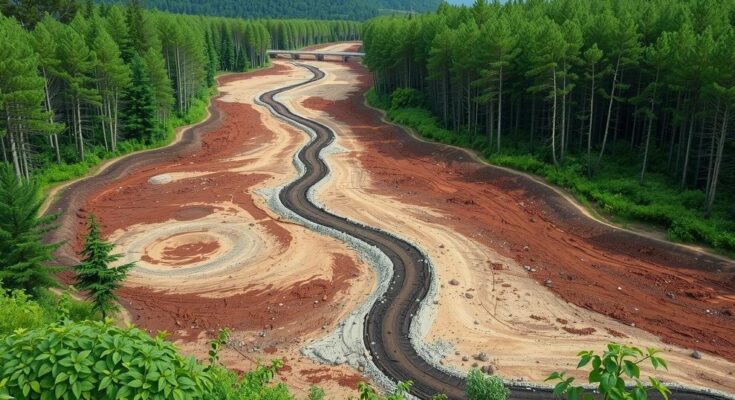A new highway is being constructed in Brazil’s Belém for the COP30 climate summit, leading to extensive deforestation of the Amazon rainforest. Despite government claims of sustainability, this project has drawn criticism from locals and conservationists for its irony and negative impact on the environment. The initiative, intended to modernize the city for the event, raises serious concerns about ecological preservation and local livelihoods.
Tens of thousands of acres of the Amazon rainforest are being cleared to construct a new four-lane highway in Brazil’s Belém, which will serve as the venue for the upcoming COP30 climate summit. This highway, named Avenida Liberdade or ‘Avenue of Liberty’, extends over eight miles and aims to alleviate traffic for the anticipated assembly of more than 50,000 attendees in November. This large-scale deforestation has drawn the ire of local communities and conservationists alike.
The contradiction of clearing a protected rainforest for a summit dedicated to climate action has attracted significant criticism. In response, the state government has promoted the highway as a “sustainable” initiative, showcasing the lush forest bordering the road amid ongoing construction. However, large logs pile up along the 13 km cleared stretch, contradicting claims of environmental responsibility.
Despite previous halts due to environmental concerns, numerous infrastructure projects have been revived or approved in light of the COP30 summit. State Secretary Adler Silveira included the highway among thirty modernization efforts aimed at preparing the city. Once completed, the highway will feature wildlife crossings, bike lanes, and solar-powered lighting, alongside additional hotel constructions and port redevelopment to accommodate cruise ships.
Furthermore, the Brazilian government has allocated over $81 million to enhance the airport’s capacity from seven million to fourteen million passengers, as noted by BBC reports. Nonetheless, local residents like Claudio Verequete, who lives near the highway construction, express their dismay over losing their means of livelihood. Verequete specifically mentioned that the trees from which he harvested acai berries have been removed, and he has not received any financial support from the state, forcing him to rely on personal savings.
In summary, the construction of a new highway in the Amazon rainforest to facilitate the COP30 climate summit has sparked controversy due to significant deforestation and its implications for local communities and environmental preservation. While the state government promotes the project as sustainable and beneficial, critics cite severe contradictions, especially in light of the conference’s climate focus. The situation reflects broader tensions between development initiatives and conservation efforts in this vital ecosystem.
Original Source: www.indiatoday.in




